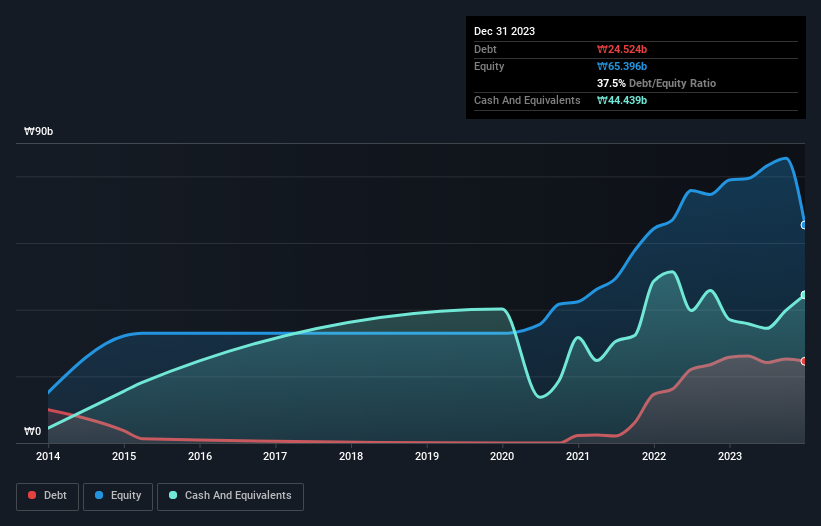- South Korea
- /
- Tech Hardware
- /
- KOSDAQ:A032680
Softcen (KOSDAQ:032680) Has Debt But No Earnings; Should You Worry?
David Iben put it well when he said, 'Volatility is not a risk we care about. What we care about is avoiding the permanent loss of capital.' So it seems the smart money knows that debt - which is usually involved in bankruptcies - is a very important factor, when you assess how risky a company is. Importantly, Softcen Co., Ltd. (KOSDAQ:032680) does carry debt. But is this debt a concern to shareholders?
What Risk Does Debt Bring?
Debt assists a business until the business has trouble paying it off, either with new capital or with free cash flow. In the worst case scenario, a company can go bankrupt if it cannot pay its creditors. However, a more frequent (but still costly) occurrence is where a company must issue shares at bargain-basement prices, permanently diluting shareholders, just to shore up its balance sheet. Of course, plenty of companies use debt to fund growth, without any negative consequences. When we think about a company's use of debt, we first look at cash and debt together.
Check out our latest analysis for Softcen
What Is Softcen's Debt?
You can click the graphic below for the historical numbers, but it shows that Softcen had ₩24.5b of debt in December 2023, down from ₩25.7b, one year before. But on the other hand it also has ₩44.4b in cash, leading to a ₩19.9b net cash position.

How Strong Is Softcen's Balance Sheet?
The latest balance sheet data shows that Softcen had liabilities of ₩32.2b due within a year, and liabilities of ₩5.00b falling due after that. On the other hand, it had cash of ₩44.4b and ₩7.22b worth of receivables due within a year. So it actually has ₩14.5b more liquid assets than total liabilities.
It's good to see that Softcen has plenty of liquidity on its balance sheet, suggesting conservative management of liabilities. Given it has easily adequate short term liquidity, we don't think it will have any issues with its lenders. Succinctly put, Softcen boasts net cash, so it's fair to say it does not have a heavy debt load! The balance sheet is clearly the area to focus on when you are analysing debt. But you can't view debt in total isolation; since Softcen will need earnings to service that debt. So when considering debt, it's definitely worth looking at the earnings trend. Click here for an interactive snapshot.
Over 12 months, Softcen made a loss at the EBIT level, and saw its revenue drop to ₩61b, which is a fall of 17%. That's not what we would hope to see.
So How Risky Is Softcen?
While Softcen lost money on an earnings before interest and tax (EBIT) level, it actually generated positive free cash flow ₩4.4b. So taking that on face value, and considering the net cash situation, we don't think that the stock is too risky in the near term. With mediocre revenue growth in the last year, we're don't find the investment opportunity particularly compelling. When analysing debt levels, the balance sheet is the obvious place to start. But ultimately, every company can contain risks that exist outside of the balance sheet. For example - Softcen has 3 warning signs we think you should be aware of.
If, after all that, you're more interested in a fast growing company with a rock-solid balance sheet, then check out our list of net cash growth stocks without delay.
New: Manage All Your Stock Portfolios in One Place
We've created the ultimate portfolio companion for stock investors, and it's free.
• Connect an unlimited number of Portfolios and see your total in one currency
• Be alerted to new Warning Signs or Risks via email or mobile
• Track the Fair Value of your stocks
Have feedback on this article? Concerned about the content? Get in touch with us directly. Alternatively, email editorial-team (at) simplywallst.com.
This article by Simply Wall St is general in nature. We provide commentary based on historical data and analyst forecasts only using an unbiased methodology and our articles are not intended to be financial advice. It does not constitute a recommendation to buy or sell any stock, and does not take account of your objectives, or your financial situation. We aim to bring you long-term focused analysis driven by fundamental data. Note that our analysis may not factor in the latest price-sensitive company announcements or qualitative material. Simply Wall St has no position in any stocks mentioned.
About KOSDAQ:A032680
Softcen
Engages in the provision of IT infrastructure and big data solutions in Korea, China, and internationally.
Mediocre balance sheet and slightly overvalued.
Market Insights
Community Narratives



